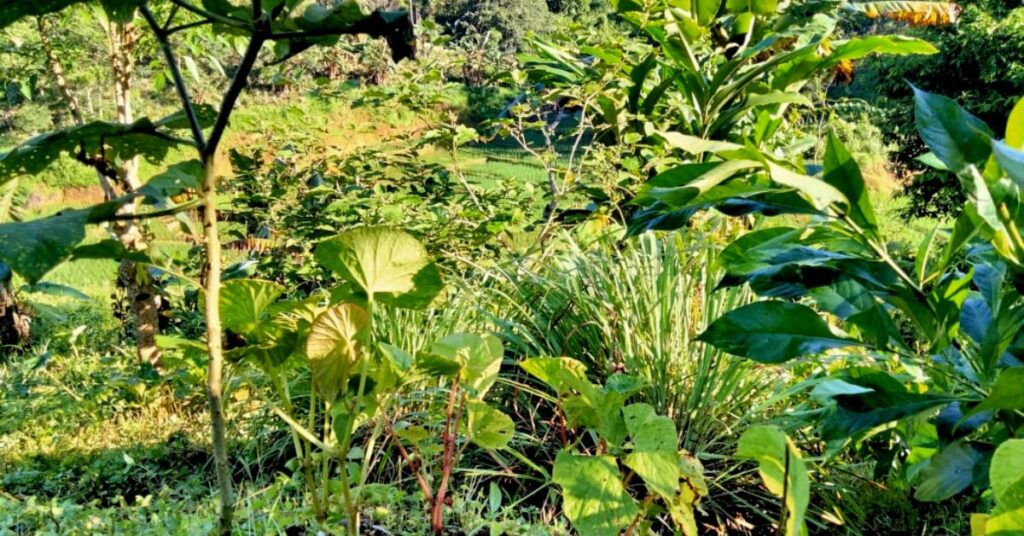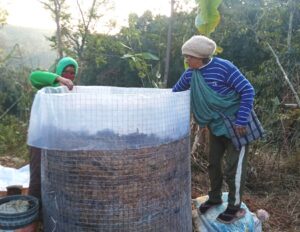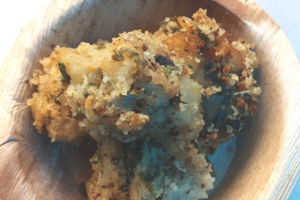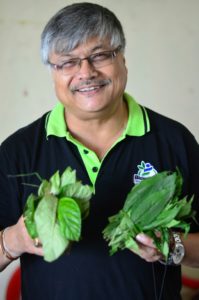Wild edibles that grow spontaneously and widely in nature consist of a major chunk of the diet of the indigenous cultures of the North East; hence the preservation and promotion of these edibles is of utmost importance given the rise of manufactured and processed foods. Agroecology Learning Circle (ALC) groups have played a large role in this process of dissemination of knowledge and creating awareness for the same. One such ALC group is the Kyrsoilang ALC which is located in Nongtyrlaw, Ri-Bhoi District; they have a biodiversity garden and the 11 members of this group came up with a joint decision to dedicate half of the garden space to growing wild edibles and the other half to indigenous medicinal plants.
A lot of these wild edibles are going extinct and the use of the medicinal plants is gradually decreasing. This initiative aims to bring about steady preservation of indigenous plants for the use of present and future generations for all their medicinal and herbal needs. This initiative started off with only five to six types of vegetative crops until the members decided to make this an all-inclusive garden will all types of wild edibles and herbs. The members insist that the youth take part in the process and do their own part in preserving the sanctity of these multi-beneficial plants. The members make it a point to organize agrobiodiversity (ABD) walks and include children in the same wherein they can inculcate habits such as identifying and hand-picking local medicinal plants and wild greens; giving them a kickstart at a young age is a primary goal of this initiative.

The biodiversity garden consists of 16 types of plants, some of which are: jamyrdoh (Chameloen plant), jewla, jakari, jamahek, skhor blang, bormanik, thylliej masi, sohngang (bitter tomotato), kynbat chih, slalamet, riaw kba, kynbat khein, tdong pait paraw, aloe vera, sohmylleng (Indian gooseberry), mawjalyngtrip. Many community members have received several benefits from these plants and more over the course of this project as it does not require them to go out of their way to search for the same.
Hong Maring, ALC member, expressed, “I am overwhelmed with joy to see that the group has begun to plant the edible wild greens or wild vegetables, it is reminiscent of old generations who used to eat and preserve these wild vegetables and their children would continue to do the same. It is truly a gift of nature to humankind.
Daplin Makri, ALC member, shared, “It has made things a lot easier for us in the village with the existence of this biodiversity garden because we no longer have to go all the way to the forest to hunt for wild edible greens or medicinal plants. It has also encouraged us bring along roots of plants to be able to plant in the garden”
Banisha Maring, ALC member, remarked, “Being a member that has been a part of this initiative, I feel that the existence of this biodiversity garden has brought about many benefits to us as well as the environment. This is why I encourage everyone to plant more of these, so we can preserve and protect what mother nature has given us. To make our gardens beautiful and healthy with the plantation of such greens.”
This initiative is part of the project – “Empowering Indigenous Communities through Agroecology Learning Circles (ALCs) for resilient, integrated and innovative natural resource management” – which is an innovation project initiated by NESFAS and supported for scaling up with funding from MBMA as part of an Innovation Grant under the World Bank aided “Community Led Landscape Management Project (CLLMP)”



